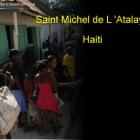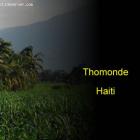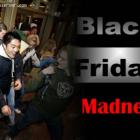ADVERTISEMENT
Security Crime Law and Order
This section will deal with crime, security, and prevention to inform you so that you can protect yourself and your family
Haiti to Create a National Security Agency
To alleviate corruption countrywide, mainly in the border with the Dominican Republic, the Haitian government declared the creation of a National Security Agency. The announcement came in public on June 12 of this year. About 2,500 persons will join the agency to monitor the traffic of goods in the border, said Interior Minister Thierry Mayard Paul. Smuggling causes the country an annual loss of $ 500 million. There will be several unit of the National Security Agency including civil protection, fire-fighter, environmental police, the permanent secretariat for risk and disaster management and coast guard, the Interior Minister added.
Haiti is one of the most corrupted countries in the world according to different international organization's survey reports. Development of the country has seriously been being hampered for quite long because of corruption. Therefore, to fight corruption the Haiti initiated a movement against corruption in the first week of June. 40 members of the electoral board and government officials who were engaged in corruption were identified in that campaign and detained. A total asset worth $92,000 was found by their name, allegedly from public funds.
Sealing of warehouse by Fresnel Jean-Baptiste and Fritz Gerard Chery
Smuggling is a punishable crime of transporting goods, and even individuals, illegally or without lawful means. This has been a growing global problem for countries that rely on the import and export exchange market. Smugglers cheat their way in without paying the proper taxes and their illegal merchandise such as drugs, firearms, and other contrabands.
The Caribbean is known for its growing smuggling problem because of the easy back-and-forth transportation between islands which lack sufficient security and checkpoints, most especially to Florida. In Haiti, smuggling has been quite rampant with discovered contrabands such as cocaine and guns that were easily entered to the country.
The Cannibal Army in Haiti
The Cannibal Army, which initially was known as Popular Organization for the Development of Raboteau came into being in the 1980s under the stewardship of Amiot Metayer. It was formed with an aim of resisting the dictatorial rule of Duvalier and was a major oppose of the 1991-1994 military regime. This made it vulnerable and increased its risk of being attacked by the army, a fact which led to what is known as the Raboteau massacre.
Following the restoration of the rule of law, the Cannibal Army became one of the most powerful gangs to be hired by politicians to bring down opponents. This was done by often utilizing some crude and uncivilized means to achieve their goal. It is said that its leader, Amiot Metayer, swore his allegiance to President Aristide and was often called upon to rein terror upon his political enemies.
The Massacre at Raboteau
The Massacre at Raboteau began April of 1991, pro-democracy candidate Jean-Bertrand Aristide won the Haitian presidency. Immediately following his victory, the de facto military dictatorship (FRAPH) Front for the Advancement and Progress of Haiti, obstructed Aristide's right to take office with a coup d'etat. In response, the citizens of Raboteau demonstrated, disseminated pro-Aristide literature, and even hid fugitives. During this overthrow of the nascent democratic government, FRAPH beat and killed 26 victims, according to News Haiti, but unofficial estimates put the total at 50.
In the same month, FRAPH invaded every home in Raboteau, arresting, beating and, sometimes, throwing their victims like garbage into open sewers. They also pursued those who escaped, stalking the citizens, arresting, torturing and/or shooting them. They even went so far as to commandeer citizen fishing vessels, shooting at escapees fleeing by sea. As a final malicious act, FRAPH refused to let victims' relatives claim their bodies.
The Sacrilege of the St. Jean Bosco Massacre targeting Jean-Bertrand Aristide
The St. Jean Bosco Massacre in Port-au-Prince occurred on September 11, 1988, in which 13 to 50 parishioners were slaughtered, according to varying sources, and the church burnt to the ground. At the time Jean-Bertrand Aristide, a Roman Catholic priest of the Salesians of the Don Bosco order, was saying mass, when the building was rushed by terrorists. Protectors hurried Aristide out of the church to a barricaded residence in one of the outlying church buildings.
The St. Jean Bosco Massacre was not the first time or last Aristide's life would be endangered. He'd already defied six or more attempts on his life, since in 1985 a mass he celebrated incited surfacing tensions, which presaged the coup of Jean-Claude Duvaliers's dictatorship. Following the massacre, the Inter-American Commission on Human Rights reported that a group of participants in the massacre appeared on Télé Nationale, Haiti's government-owned television station, and promised a 'heap of corpses' at any mass that Aristide celebrated.
Tonton Macoutes in Haiti, an Evil Legacy of the Duvalier Dynasty
Tonton Macoutes, a militia force put together in 1959 by President François Duvalier, translated, means Uncle Gunnysack, referring to a bogeyman that captures children in a gunnysack and eats them for breakfast. Duvalier created the militia, because he felt threatened by the Haitian army. When his political foes attempted to oust him, Duvalier broke up the army and scattered the police. He then had all the Military High Command generals assassinated.
Tonton Macoutes wore a uniform of straw hats, blue denim shirts, and sunglasses, and were armed with machetes. It's a chilling image, because--if not for the machetes-- one would think they were heading to a picnic or barbeque, which renders them all the more sinister-looking, an appearance that is the personification of pure evil.
Vladimir Jean-Baptiste Caught Smuggling Guns into Haiti in Dog food
Vladimir Jean-Baptiste is a 40 year old legal resident of Haiti who is a close friend to the President of Haiti. He took advantage of his closeness to the President by doing illegal business of bringing guns in Haiti from U.S. He was arrested and taken to West federal court for smuggling over two dozen semi-automatic handguns and shorts guns in the boxes of food. When he was interrogated he owned up to the accusations and admitted to have been involved with illegal business.
Vladimir Jean-Baptiste admitted to have collaborated with Haitian officials who gave him a Blackberry phone. The Haitian government respected and feared him because of his closeness to the president. He took advantage of their fear used government officials in his illegal business. Bringing guns to Haiti meant endangering the security of Haitians. Therefore it was taken as a serious offense that led to five years imprisonment.
Four People Linked To Clifford Brandt Case so Far
Four individuals have been dragged into the case of Clifford Brandt, who was arrested over the abduction of Coralie and Nicolas Moscoso. The four other suspects are Brandt's secretary, Swadienne Jean and her husband Franck Sainterine, as well as Ricot Pierreval and Carlo Saint-Fort. They, along with Brandt, were arrested, with Pierreval and Saint-Fort caught as they were trying to cross the border between Haiti and the Dominican Republic.
The five suspects have appeared before the Prosecutor of Port-au-Prince on Thursday with Geral Norgaisse as the acting Government Commissioner. After presenting a set of evidence, the prosecution made a decision to incarcerate the suspects. Instead of the National Penitentiary, the suspects were sent to the Civil Prison of Carrefour due to safety issues. Norgaisse refused to divulge too much information about the case because of its sensitivity. He said though that a judge will be assigned to take and oversee the case.
The Security Situation In Haiti
Haiti has a lot of security and safety issues, as crime rates in the country remain high. This is attributed to the increase in drug trade cases in the country and the police force's lack of resources. Among the common crimes in Haiti include murder, kidnapping, drugs, robberies, home break-ins, and car napping. Not only do locals are victimized but also foreigners.
There are home burglary cases wherein criminals kill or hurt the victims to make sure that they get what they want. And criminals often work in groups. They attack and overpower the victims so as to prevent them from fighting back.
Clifford Brandt, Haiti Prominent Businessman's son arrested for Kidnapping
Clifford Brandt, son to a prominent Haitian businessman, was locked up on Monday following allegations of kidnapping.
The matter is being investigated by Haitian police. Authorities on Wednesday said Clifford Brandt played a central role in the kidnapping of two children.
Frantz Lerebours, the police spokesman said the arrest of Clifford was because he was a suspect for having been involved in the kidnapping of two children of a family in Haitian capital, Port-au-Prince.
Brandt led the investigating policemen to the place where the two children were held. The police freed the children and arrested Brandt.
Our objective is to share with you news and information about Haiti and the people of Haiti. Traditions, habits and the way we were or grew are alive in this site. We highly recommend that you Subscribe to our Newsletter and also share with us some of the things that are memorable and made us unique people.

 Saint Michel de L 'Atalaye
Saint Michel de L 'Atalaye  Thomonde, Haiti
Thomonde, Haiti  Black Friday Shopping Season
Black Friday Shopping Season  Haitians are a Proud People
Haitians are a Proud People  Haitian Creole Translation
Haitian Creole Translation